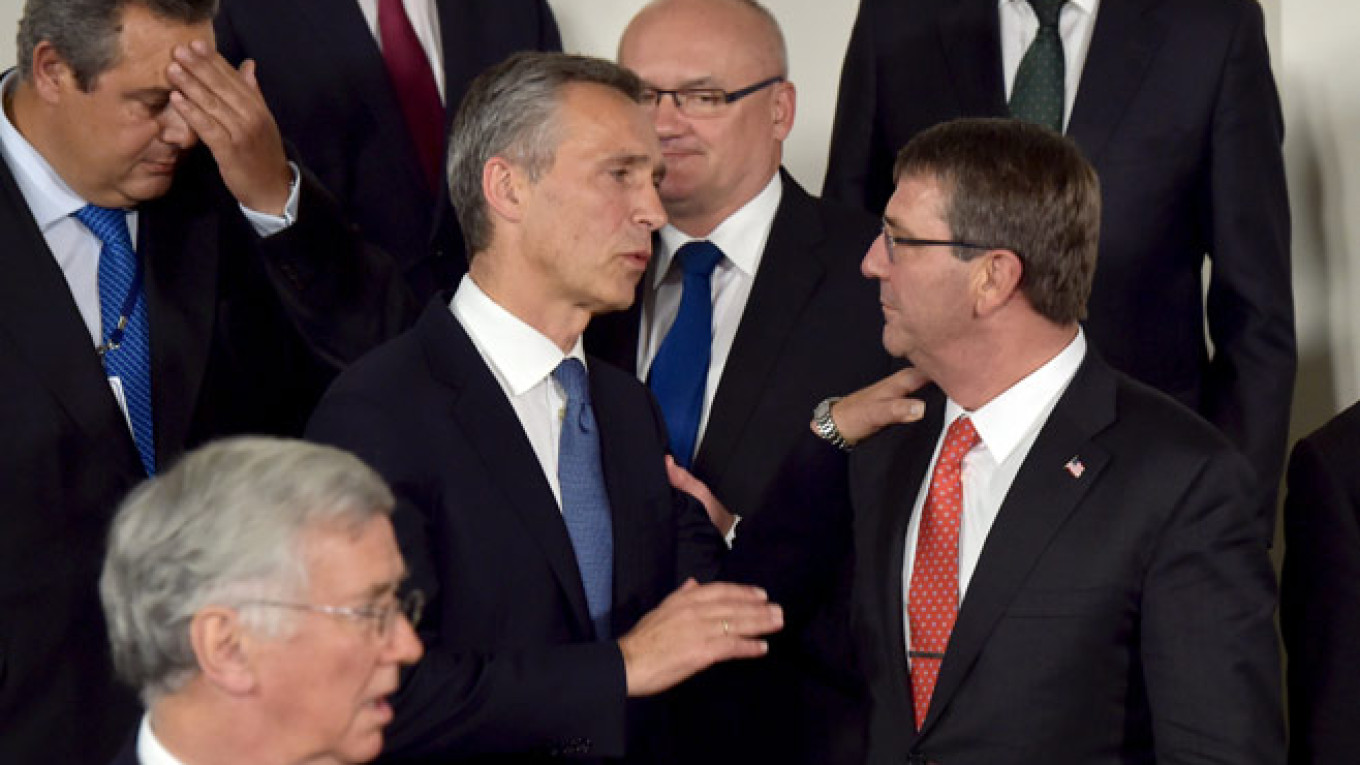As tensions between Russia and the West continue to flare over Ukraine, defense ministers representing NATO's 28 member states met in Brussels this week to agree on measures to further reinforce its eastern flanks against possible attacks by Moscow.
The meeting, which took place in the wake of heightened nuclear rhetoric from the Kremlin and the symbolic positioning of military equipment in the Baltic states by the Pentagon, saw both sides accuse the other of being responsible for escalating tensions.
"Russia is challenging Euro-Atlantic security through military action, coercion and intimidation of its neighbors," the NATO defense ministers said in a statement following the conclusion of their summit on Thursday.
"We continue to be concerned about Russia's aggressive actions," the statement added.
President Vladimir Putin said in response Thursday: "we do not have and cannot have any aggressive plans. We are threatening no one," he said, news agency TASS reported.
Tensions between Russia and NATO have been high ever since Moscow annexed Ukraine's Crimean Peninsula last year,? an action NATO decried but Moscow has defended as being necessary to prevent the Western military alliance from establishing a naval base there.
Rapid Response Force
On Wednesday, the 28 ministers agreed to boost the strength of its rapid response force from 13,000 to 40,000 troops in a bid to further deter Russia from attacking one of the Baltic states — the former Soviet nations of Latvia, Lithuania and Estonia.
NATO's decision comes just days after U.S. Defense Secretary Ashton Carter announced the Pentagon would pre-position 250 units of heavy military hardware — including M1 Abrams battle tanks — in the Baltic.
An unidentified Russian Defense Ministry official was quoted by Reuters on Monday as saying that the U.S.'s positioning of hardware near the Russian border was Washington's most aggressive act since the Cold War.
Nikolai Patrushev, the head of Russia's National Security Council pledged Thursday that "Russia will react appropriately to plans to increase NATO's rapid reaction force in Europe," news agency RIA Novosti reported. Patrushev did not specify what form the reaction might take.
The Defense Ministry did not respond to a question from The Moscow Times concerning how Russia might respond to NATO's new deployments along its border.
Vasily Kashin, a military expert at the Moscow-based Center for the Analysis of Strategies and Technologies, a defense think tank, said the likely Russian response would be to continue reinforcing its western joint strategic command.
"It is possible that the [western command] will be given additional priority in getting new weapons,"? Kashin said.
Funding Ploy?
Deputy Prime Minister Dmitry Rogozin — Russia's former envoy to NATO — brushed off the alliance's claims of Russian aggression, saying that NATO was merely trying to scare its members into honoring their funding pledges.
"NATO creates a problem and then 'struggles heroically' with it," Rogozin wrote on his Twitter page, adding that it was a time-honored technique for proving the relevance of the Cold War military alliance and securing funding from its member states.
A NATO report published on Tuesday showed that the total expenditures of its 28 members will fall by 1.5 percent in real terms this year, following a 3.9 percent fall in 2014. So far only five NATO members are honoring an agreement made in Wales last year to set defense spending at 2 percent of national GDP. ?
Boosting Support for Ukraine
NATO Secretary-General Jens Stoltenberg used the defense ministers' summit as an opportunity to warn of renewed fighting in eastern Ukraine, accusing Russian-backed rebels of violating the delicate Minsk II cease-fire agreement with the government in Kiev and risking a return to heavy fighting.
"Russia continues to support the separatists with training, weapons and soldiers. And it still has a large numbers of forces stationed on its border with Ukraine," Stoltenberg said in a televised press conference on Thursday.
Despite requests from Kiev for military support from the West, NATO has not intervened on Ukraine's behalf with military forces. It has, however, provided financial aid and training to the country's beleaguered armed forces, who have struggled to take back rebel-held territory in eastern Ukraine.
NATO on Thursday pledged continued support for Ukrainian military reforms, although CAST's Kashin said such reforms would likely be stymied by ingrained corruption within the Ukrainian army.
But even if NATO's aid to Ukraine is ineffective, Moscow will likely view the move as yet more evidence of the alliance's ill will toward Russia.
Russia's obvious response to NATO's engagement with Kiev "will be increased training and support for the rebels — at least as long as there is no political solution to the conflict,"? Kashin said.
Contact the author at [email protected]
A Message from The Moscow Times:
Dear readers,
We are facing unprecedented challenges. Russia's Prosecutor General's Office has designated The Moscow Times as an "undesirable" organization, criminalizing our work and putting our staff at risk of prosecution. This follows our earlier unjust labeling as a "foreign agent."
These actions are direct attempts to silence independent journalism in Russia. The authorities claim our work "discredits the decisions of the Russian leadership." We see things differently: we strive to provide accurate, unbiased reporting on Russia.
We, the journalists of The Moscow Times, refuse to be silenced. But to continue our work, we need your help.
Your support, no matter how small, makes a world of difference. If you can, please support us monthly starting from just $2. It's quick to set up, and every contribution makes a significant impact.
By supporting The Moscow Times, you're defending open, independent journalism in the face of repression. Thank you for standing with us.
Remind me later.


